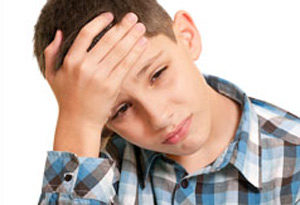 Sit and watch children at play and you will quickly learn one thing: children are constantly hitting their heads! If your child hits his or her head, how do you know when it is serious enough to seek medical care and when you can relax and stay home? If there is an open wound to the head after a fall, apply pressure to the wound with a clean towel. Remember, the scalp is rich with blood vessels and a cut on the scalp can bleed profusely. If your child is alert, acting normally, isn’t vomiting, and isn’t bleeding after the pressure was put on the wound, take him to the doctor’s office. He may need staples for the laceration on his scalp. Head injuries can be very frightening. With active children, they are extremely common though. The horrible sound of your child’s head hitting a surface from a fall is one of the worst in the world. Most parents can remember those moments quite clearly.
Sit and watch children at play and you will quickly learn one thing: children are constantly hitting their heads! If your child hits his or her head, how do you know when it is serious enough to seek medical care and when you can relax and stay home? If there is an open wound to the head after a fall, apply pressure to the wound with a clean towel. Remember, the scalp is rich with blood vessels and a cut on the scalp can bleed profusely. If your child is alert, acting normally, isn’t vomiting, and isn’t bleeding after the pressure was put on the wound, take him to the doctor’s office. He may need staples for the laceration on his scalp. Head injuries can be very frightening. With active children, they are extremely common though. The horrible sound of your child’s head hitting a surface from a fall is one of the worst in the world. Most parents can remember those moments quite clearly.
What Should You Do?
Minor Head Injuries Without Open Wounds
Fortunately, serious injury to the brain from minor head trauma is very rare and most bumps to the head are safe. Symptoms of minor head injuries like bruises or mild headaches go away on their own. For most minor head injuries without open wounds, you should put ice on the area that was hurt to help reduce swelling. Watch your child closely for the first 24-48 hrs after the head injury. Avoid giving Tylenol or Motrin so that you don’t mask any symptoms. You should wake your child at least once that night to make sure that he/she is okay. Avoid contact sports or any activities that could result in another head injury until your child is completely symptom-free. If the head injury occurred while playing sports, consult your team doctor or your child’s doctor to determine when it is safe to return to play.
When to Call the Doctor
Symptoms to call your child’s doctor about:
- Convulsions
- Changes in speech: slurred words or inability to come up with the right words
- Changes in hearing, smell or taste
- Breathing that becomes slow or very shallow
- Neck pain
- Changes in level of consciousness (from alert to very sleepy or confused)
- Persistent or severe headache
- Weakness or loss of strength
- More than one episode of vomiting
Bleeding Inside the Head is the Main Worry
Most people appreciate that injuries occur when great force is applied to the head. Falling from a height or being involved in a car accident may cause compression or deceleration forces that can damage the skull without necessarily lacerating or cutting the scalp. External bleeding is easy to recognize. Internal bleeding may be more difficult to appreciate. Bleeding inside the head is the main worry after a head injury. Bleeding or swelling inside the head usually takes place during the first 24-48 hours after an injury and can cause life-threatening pressure on the brain. This pressure results in headaches, irritability, recurrent vomiting, vision/pupil changes, and changes in alertness.
Checking Your Child’s Pupils
Most people will check their child’s pupils to see if they are the same size. While it is fine to do this, unequal pupils usually show up only after there is quite a bit of pressure from an internal brain bleed. Just because the pupils are the same size early on, it does not mean that all is well. Watch for other signs such as the ones mentioned above. While internal bleeding is rare from mild head injuries, you should watch your child carefully for signs and symptoms.
Contact Us (859-525-8181) if you have any questions!
—
 About Pediatrics of Florence
About Pediatrics of Florence
We believe that children are more than just “little adults.” They have unique personalities, challenges, and life circumstances and we have made every effort to make our offices and care as “kid friendly” as possible. We have an aquatic theme in the waiting rooms (separated for sick and well children) as well as themed examination rooms. All of our physicians are Board Certified Pediatricians and members of the American Academy of Pediatrics and our nurse practitioners are all licensed Pediatric Nurse Practitioners and are available to see both well and sick children.
>> Learn More About Pediatrics of Florence
